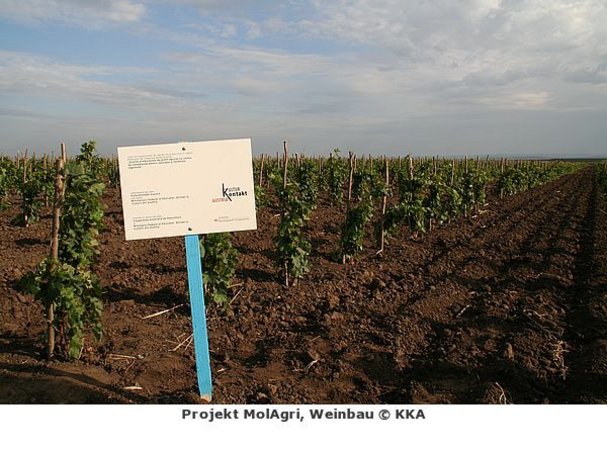Development of Practice-Oriented Vocational Education and Training
Practice-oriented vocational education and training and further education that responds flexibly to the ever faster changing needs of the labour market, has quality assurance mechanisms and offers a wide range of options with horizontal and vertical permeability is a high priority.
The OeAD offers support in the development of practice-oriented education and training profiles and regional school profile development. We promote new forms of cooperation between schools and the business sector and provide advice on the development of curricula and teaching materials. Other important components of our projects are further training for teachers, training for multipliers, training for headmasters/headmistresses in new forms of management and quality development as well as the integration of information and communication technologies in vocational education and training (e.g. in the form of digital business). The content focuses on the areas of business, tourism and IT education.
Example: Entrepreneurship Learning
The promotion of entrepreneurship as a motor of economic development, and also as a key competence that enables individuals to develop their personal potential to the best possible extent, is a development priority within the EU and beyond it. Education plays a central part in this context. However, in order to successfully promote entrepreneurship learning, new approaches to teaching and learning and new forms of cooperation with the business sector are required. Based on the experience with the implementation of education in training firms in South Eastern Europe as of 2001 the OeAD has been working in the regional project "Entrepreneurship Learning" with experts from Albania, Kosovo and North Macedonia on the introduction of new teaching and learning methods since the autumn of 2014. In all three countries the subject "Entrepreneurship" is taught for at least one year at vocational schools. The aim of the project is to contribute to improving the quality of teaching in the field of entrepreneurship learning in vocational education and training. Within the scope of the project 17 multipliers from the three countries have been trained to share new teaching and learning approaches to entrepreneurship learning, and training modules for entrepreneurship learning have been developed. These modules provide the basis for further training for some 250 teachers in more than 130 schools of vocational education and training in the three partner countries for the implementation of innovative learning approaches to promote entrepreneurship learning. At the same time a multilingual toolkit for entrepreneurship learning has been developed and is available to the schools of vocational education and training in each country. Within the framework of innovative teaching and learning approaches one focus is on cooperation between schools and the business sector.
Example: VEN – Generating Income at VET Schools and Colleges
The aim of the project is to work together with decision-makers and school representatives to improve the possibilities of transparent income generation for vocational schools in order to improve the quality of vocational education and training. Within the framework of the project seven vocational training schools with a potential for generating income were supported in the first phase in the development of corresponding school entrepreneurship and in taking the first steps towards transparent income generation within the existing legal framework based on a needs assessment. The schools developed business plans, carried them out to generate income in accordance with the training profiles, and established transparent financial management that enabled the additional funds to be reinvested to improve the quality of the school offering. Moreover, in an accompanying study, the possibilities for income generation within the existing legal framework were explored and recommendations were drawn up with decision-makers from the relevant ministries as to which legal changes would be required to enable efficient and transparent generation of income to increase the quality of vocational schools. Based on these experiences the inter-ministerial working group on income generation will be supported in the development of an action plan for the introduction of school income generation. Guidelines, templates, and tools for the implementation of transparent income generation will be developed in cooperation with the relevant ministries on the basis of the action plan and the need for training and support structures will be ascertained. In cooperation with relevant partner institutions appropriate training programmes for all levels of the education system will be developed and piloted.
The inter-ministerial working group will also receive continued support in the issue of adapting the legal framework. In this project the OeAD works together with the Liechtenstein Development Service (LED).
Example: Cooperation between schools and business in the tourism sector
Close cooperation between vocational schools and businesses is a prerequisite for high-quality vocational training that is geared towards the needs of the labour market. The goal of the regional "Cooperation between Schools and Business" project is to improve the quality of practical training for pupils by improving cooperation between partners in the tourism industry and tourism and hospitality management schools. The focus is on the organisation of qualitative company internships.
The project results include the development and anchoring of an expanded task profile for the practice-oriented vocational instruction coordinators as liaisons between schools and businesses, particularly in the organisation of company internships. To implement the new task profile guidelines are developed that also include measures to anchor the cooperation between schools and businesses in school quality development. National web portals and other dissemination mechanisms are developed to improve the flow of information between businesses and schools. The project’s regional focus will allow the exchange of experience in this field between Bosnia and Herzegovina, Montenegro, Serbia and Austria.
In order to anchor the new task profile for the practice-oriented vocational instruction coordinator in the education systems nationwide workshops with relevant stakeholders are organised. Representatives from around 50 schools that provide training in the tourism industry are trained in methods to improve cooperation with businesses to increase the quality of company internships. The handbook for the practice-oriented vocational instruction coordinators as well as good practice examples of cooperation between schools and businesses are designed to help the schools to further develop their cooperation with businesses.
Beispiel: Entrepreneurship Learning
Die Förderung von Entrepreneurship als Motor für wirtschaftliche Entwicklung, aber auch als Schlüsselkompetenz, die dem/der Einzelnen die bestmögliche Entfaltung des eigenen Potentials ermöglicht, ist eine Entwicklungspriorität innerhalb der EU und darüber hinaus. Bildung spielt in diesem Kontext eine zentrale Rolle. Für die erfolgreiche Förderung von Entrepreneurship Learning bedarf es allerdings neuer Lehr-/Lernzugänge und -settings und neuer Partnerschaften mit der Wirtschaft. Aufbauend auf den Erfahrungen mit der Implementierung des Übungsfirmen-Unterrichtes in Südosteuropa ab 2001 arbeitet der OeAD seit Herbst 2014 in dem regionalen Projekt "Entrepreneurship Learning" mit Expertinnen und Experten aus Albanien, dem Kosovo und Mazedonien an der Einführung von neuen Lehr- und Lernmethoden. In allen drei Ländern gibt es an berufsbildenden Schulen das Fach "Entrepreneurship" in mindestens einem Jahrgang. Ziel des Projekts ist es, einen Beitrag zur Verbesserung der Qualität des Unterrichts im Bereich Entrepreneurship Learning in der Berufsbildung zu leisten. Im Rahmen des Projekts wurden 17 Multiplikatorinnen und Multiplikatoren der drei Länder zur Vermittlung neuer Lehr- und Lernzugänge für Entrepreneurship Learning ausgebildet und Fortbildungsmodule für Entrepreneurship Learning entwickelt. Diese sind Basis für die Fortbildung von rund 250 Lehrerinnen und Lehrern an über 130 berufsbildenden Schulen in den drei Partnerländern zur Umsetzung innovativer Lernzugänge zur Förderung von Entrepreneurship Learning. Parallel dazu wurde ein mehrsprachiges Tool Kit entwickelt, das den berufsbildenden Schulen der einzelnen Länder für den Bereich Entrepreneurship Learning zur Verfügung gestellt wird. Im Rahmen der innovativen Lehr-, Lernzugänge liegt ein Schwerpunkt auf der Kooperation Schule – Wirtschaft.
Beispiel: VEN – Einkommensgenerierung an berufsbildenden Schulen und Kollegs
Ziel des Projektes ist es, gemeinsam mit Entscheidungsträgerinnen und Entscheidungsträgern und Schulvertreterinnen und Stellvertretern die Möglichkeiten der transparenten Einkommensgenerierung von Berufsschulen zur Steigerung der Qualität der Berufsbildung zu verbessern. Im Rahmen des Projekts wurden in der ersten Phase auf Basis einer Bedarfserhebung sieben berufsbildende Schulen mit Potential zur Einkommensgenerierung darin unterstützt, entsprechendes schulisches Unternehmer/innentum zu entwickeln und im Rahmen der bestehenden gesetzlichen Rahmenbedingungen erste Schritte in der transparenten Einkommensgenerierung zu setzen. Die Schulen entwickelten Business-Pläne, setzten diese im Rahmen der Ausbildungsprofile zu Einkommensgenerierung um und etablierten ein transparentes Finanzmanagement, das die Reinvestition der zusätzlichen Mittel zur Qualitätsverbesserung der schulischen Angebote ermöglichte. Daneben wurden in einer begleitenden Studie die Möglichkeiten der Einkommensgenerierung unter den bestehenden gesetzlichen Rahmenbedingungen erhoben und mit Entscheidungsträgerinnen und Entscheidungsträgern der relevanten Ministerien Empfehlungen erarbeitet, welche gesetzlichen Änderungen notwendig wären, um effiziente und transparente Einkommensgenerierung zur Erhöhung der Qualität von berufsbildenden Schulen zu ermöglichen. Basierend auf diesen Erfahrungen wird die interministerielle Arbeitsgruppe zur Einkommensgenerierung in der Entwicklung eines Aktionsplans zur Einführung von schulischer Einkommensgenerierung unterstützt. In Abstimmung mit den relevanten Ministerien werden darauf basierend Guidelines, Vorlagen und Instrumente für die Umsetzung von transparenter Einkommensgenerierung erarbeitet und der Bedarf an Fortbildungsangeboten und Stützstrukturen erhoben. In Kooperation mit relevanten Partnerinstitutionen werden entsprechende Fortbildungsangebote für alle Ebenen des Bildungssystems entwickelt und pilotiert.
Daneben erhält die interministerielle Arbeitsgruppe weitere Unterstützung in der Frage der Anpassung der rechtlichen Rahmenbedingungen. In diesem Projekt arbeitet der OeAD zusammen mit dem Liechtensteinischen Entwicklungsdienst LED.
Beispiel: Kooperation Schule – Wirtschaft im Bereich Tourismus
Voraussetzung für eine qualitativ hochwertige, arbeitsmarktrelevante Berufsbildung ist eine enge Kooperation zwischen der Berufsbildung und Betrieben. Projektziel des regionalen Projekts "Kooperation Schule – Wirtschaft" ist die Erhöhung der Qualität der praktischen Ausbildung von Schülerinnen und Schülern durch die Verbesserung der Kooperation zwischen Partnern aus der Tourismuswirtschaft und den Tourismus- und Gastgewerbeschulen. Der Fokus dabei liegt auf der Organisation von qualitativen Betriebspraktika.
Zu den Projektergebnissen gehören die Erarbeitung und Verankerung eines erweiterten Aufgabenprofils der schulischen Fachpraxiskoordinatorinnen und -koordinatoren als Schnittstellen zwischen Schulen und Betrieben, besonders in der Organisation von betrieblichen Praktika. Zur Umsetzung des neuen Aufgabenprofils werden Guidelines entwickelt, die auch Maßnahmen zur Verankerung der Kooperation Schule – Wirtschaft in der schulischen Qualitätsentwicklung beinhalten. Zur Verbesserung des Informationsflusses zwischen Betrieben und Schulen werden nationale Webportale und andere Disseminationsmechanismen entwickelt. Der regionale Fokus des Projekts ermöglicht den Austausch von Erfahrungen zwischen Bosnien-Herzegowina, Montenegro, Serbien und Österreich in diesem Bereich.
Zur Verankerung des neuen Aufgabenprofils der Fachpraxiskoordinatorinnen und -loordinatoren in den Bildungssystemen werden landesweit Workshops mit relevanten Stakeholdern veranstaltet. Vertreter/innen von rund 50 Schulen, die Ausbildungen im Bereich Tourismus anbieten, werden in der Verbesserung der Kooperation mit Betrieben zur Erhöhung der Qualität betrieblicher Praktika geschult. Der Leitfaden für Fachpaxiskoordinator/innen sowie Good-practice Beispiele der Kooperation zwischen Schulen und Betrieben sollen die Schulen darin unterstützen, ihre Kooperationen mit Betrieben weiter auszubauen.



